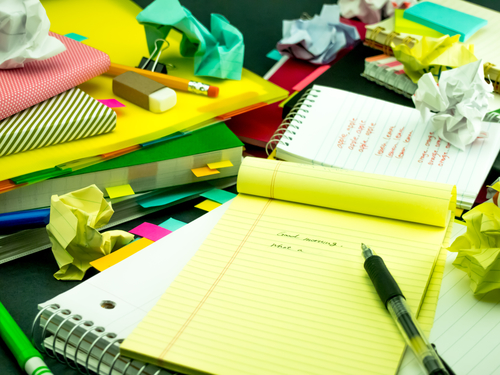
9 Ways for Students to Stay Organized
 As the school year revs up into high gear, it can be overwhelming to try to stay organized, for adults, kids, and teens alike. Here are nine helpful tips for students who want to stay organized when their plates become full, as they are bound to do.
As the school year revs up into high gear, it can be overwhelming to try to stay organized, for adults, kids, and teens alike. Here are nine helpful tips for students who want to stay organized when their plates become full, as they are bound to do.
1. Use Organizational Supplies: Having the right school and office supplies greatly increases your ability to become organized. Binders and notebooks for papers and pouches or boxes for writing utensils are just a few of the materials that can help you to keep your class supplies from becoming lost and tangled. Physically grouping and dividing your materials by subject helps you to keep track of your work. If you use a tablet or calculator, keep them in their cases when not in use so that they are both safe and easy to find. Shelves, cubbies, and drawers come in handy too, both at school and at home–Kids’ Health shares that you “might want to set up a file drawer at home to keep track of research, returned assignments, and other things you want to hold on to.” Online calendar sites and to-do list apps can also be helpful (see number nine below).
2. Get Ample Rest: All people need rest, and those with growing bodies definitely need to recharge fully. Even when your schedule is busy or you feel like staying up, get to bed at a reasonable time and, if possible, get into a routine so that your body knows when it can expect to sleep or be awake. This is a way for you to organize your time and your day so that your schedule is somewhat predictable and reliable. When you have slept well, you will be more aware, alert, and prepared in the morning to rise to the school day’s challenges.
3. Take Your Time in the Morning: While this is sometimes easier said than done, leaving time to fully get ready to leave for school can do wonders for your level of organization and sense of preparedness. It’s natural to be sleepy and groggy in the morning, and if you are running low on time, you are more likely to forget something important. As Get Organized Now puts it, “DON’T RUSH. Wake up early enough for school to arrive well ahead of time.” They also recommend that once you know the general time it takes you to get ready in the morning, you add 15 minutes of cushion time for the unexpected. Having a few extra minutes here and there never hurts and can give you a valuable opportunity to review and plan for the day ahead.
4. Organize Your Locker and Desk: If you use a locker, it can be a place of refuge for you during the day. Keeping a favorite photo or drawing in your locker personalizes it, and keeping it organized makes it useful. You can organize your locker with stacking or hanging shelves or dividers in order to organize it by subject, day of the week, or period. A locker shelf can definitely even be of the DIY variety–here’s a simple corrugated cardboard one from Instructables. This can be decorated with markers or colored paper if you prefer. A simple message board or notepad in a locker can help you to remember assignments and appointments. If you use the same desk every day or frequently, resist the urge to use it as a hold-all or a trash can. If you keep your desk clean and stocked with a few useful and relevant supplies, it can become a supportive tool for organization as well as a place to sit and learn.
5. Organize Daily at Home: The tricky thing about clutter is that it builds up slowly over time. One way to decrease the amount of clutter build-up, disorganization, and mess in your life is to dedicate a few minutes when you get home each day to orderly unpacking. Mari-Jane Williams of the Washington Post writes about this practice and says that if a student “has any papers that she put in the wrong place in her rush to get packed up and to the bus, she should file them correctly.” This can set you up for an easier experience finding materials and getting work done during homework time or the next morning at school.
6. Create an Area for Homework: Having a specific place arranged where you can quietly concentrate helps to keep your school work and supplies from becoming spread all over your home and potentially lost. Even if there isn’t a separate room for this regularly available, try to schedule and claim some time and space at a kitchen table or in your bedroom when you can spread out your materials, work, and concentrate with limited interruptions. Keeping the place where you work fairly consistent can help you to set up a routine and to feel calmer and more comfortable and focused when you are working. Having some shelves or, as mentioned earlier, a file drawer in this space in which to keep extra supplies, finished projects, and helpful books and references is a great idea as well.
7. Schedule and Track Your Extra Activities and Downtime: Be careful not to constantly add more activities into your schedule without taking the time to consider what you have already committed to. Keeping an organized calendar or datebook can help you not to double-book yourself or over-do it. Scheduling time for schoolwork can help those who tend to get caught up in socialization and/or procrastination or who may forget assignments. It’s important to also set aside and even schedule free time to relax, especially if you tend to participate in multiple kinds of athletics, clubs, or other activities.
8. Use an Organization App: Most students at almost any grade level are now becoming used to, and are sometimes even more comfortable with, using technology in learning environments. There are a variety of apps that students can use to stay organized, and the Huffington Post recommends these two, among others: the “Complete Class Organizer,” which costs $4.99 and helps you to keep track of notes, schedules, and grades, and “Epic Win,” which costs $2.99 and gives each user an avatar, tasks, quests, and achievement points.
9. Accept Imperfection and Keep Going: You will occasionally lose a piece of paper or forget plans you have made–that’s okay. Working on organization is meant to help and not encumber you, so try not to use it as a way to punish or imprison yourself when you and your life are inevitably imperfect and messy. When you find things getting disorganized and out of hand, take a deep breath and start again.
Organization is a personal art, and it’s important that you trust yourself and use the organizational tools and systems that work best for you.
Written by Julia Travers
Contact us today to learn more about how our tutors can help your child as they start school this fall!



